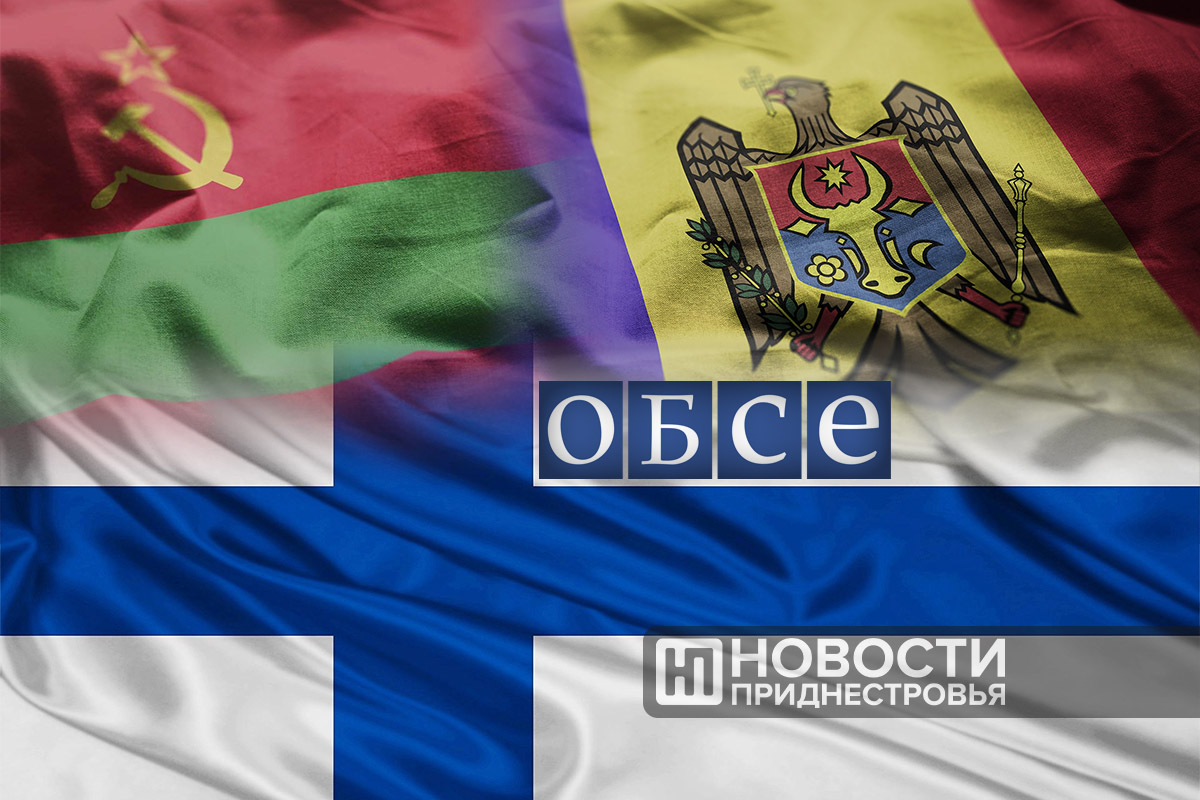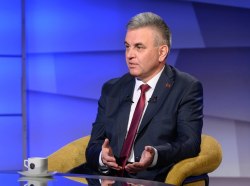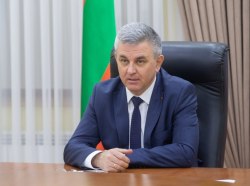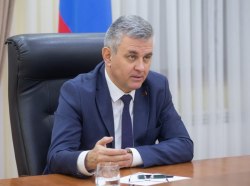Tiraspol, December 12. /Novosti Pridnestrovya/. The Moldovan-Pridnestrovian negotiation process turned 30 this year. Yet this date could not be marked with any agreements. Unfortunately, the outgoing year here has become another stage of missed opportunities.
New problems have emerged in relations between Tiraspol and Chisinau - first of all, unjustified customs duties against Pridnestrovian enterprises. The international 5 + 2 format still does not work, there were no meetings at the level of the leadership of the PMR and the RM. Political representatives of the parties Vitaly Ignatiev and Oleg Serebryan held three meetings in a year. This is one meeting more than in 2023 (then there were only two meetings, which was the absolute minimum since 2011). But concrete results were also not achieved.
Pridnestrovie tried to breathe life into the negotiations. One of the main proposals of Tiraspol is to sign a Declaration of Commitment to Peaceful Methods of the Moldovan-Pridnestrovian Settlement. Such a document would become an additional guarantee of security for the societies of both countries against the backdrop of a very unstable regional situation. At the same time, Moldova would demonstrate the sincerity of its peaceful intentions, which its authorities always talk about.
The draft Declaration was sent to Chisinau back in May. It was then discussed at a meeting of political representatives on November 19. On November 20, the final version of the document, consisting of two short parts, was sent to Chisinau. The first of them is a proposal from the OSCE Mission, that is, the mediator, and the second was agreed upon with Oleg Serebryan at the meeting.
It seemed that there were no more obstacles to signing the document, but the political representative of the Republic of Moldova again refused to endorse it, demanding through the Moldovan media to include the unacceptable wording about the "territorial integrity of Moldova".
At the same time, there is still no official written response from Chisinau to the revised draft.
According to the head of the Main Foreign Policy Department of the Ministry of Foreign Affairs of Pridnestrovie, Dmitry Palamarchuk, "The Declaration was also an important test for Moldova's ability to negotiate." It turns out that this test was not passed, and the parties are approaching the new negotiating season with zero baggage.
The Maltese Chairmanship of the OSCE turned out to be largely fruitless. The current chairman, Maltese Foreign Minister Jan Borch, visited Pridnestrovie and Moldova in April of this year. In Bendery, he said that "it is very important not to give up and try to bring the solution of existing problems closer." But things did not go further than that.
Meanwhile, now, in conditions when the other two mediators in the 5 + 2 negotiating format - Russia and Ukraine - are still in a situation of acute confrontation, the role of the OSCE as a mediator is noticeably increasing.
______________________________________
In 2025, the Chairmanship of this organization will pass to Finland, and quite high expectations are associated with this. Including because Helsinki already dealt with Pridnestrovie and Moldova in 2008, also within the framework of the OSCE Chairmanship-in-Office. Then the Finns immediately got down to business: their then Minister of Foreign Affairs Ilkki Kanerva arrived in Tiraspol on January 17. Before that, he visited Chisinau and Kyiv. It was clear that the Finnish diplomats wanted to thoroughly study the problems of relations between the PMR and the RM.
"The OSCE will find itself in a difficult situation if it pursues a policy based on pressure. And although I have not yet delved very deeply into the details of frozen conflicts, I am inclined to believe that it is better to use the carrot than the stick," Ilkki Kanerva said then, answering questions from Ukrainian journalists about the settlement of regional conflicts. As the head of the Ministry of Foreign Affairs of Pridnestrovie Vitaly Ignatiev recalled in an interview with RIA Novosti, it was during the Finnish chairmanship that the position of Special Representative of the OSCE Chairman-in-Office for the Moldovan-Pridnestrovian settlement appeared. The first to occupy it was diplomat Heikki Talvitie, then Chairman of the Finland-Russia Friendship Society. The Finnish Chairmanship helped achieve concrete results. In Odessa there was held an international seminar on trade and banking issues, which have always been acute in relations between the PMR and the RM. In 2008, after a seven-year break, two meetings of the presidents of Pridnestrovie and Moldova took place, and the preconditions for restoring the work of the 5 + 2 format were laid. As now, it was also frozen then, also due to the position of Chisinau. The origins of what was achieved later, in 2011 – unblocking the 5 + 2 format, a joint statement by the heads of Pridnestrovie and Moldova Igor Smirnov and Vladimir Filat, continued work on resuming full-fledged rail service – lie precisely in 2008.
Now, Finnish diplomats, too, apparently, are serious: according to Dmitry Palamarchuk, preliminary contacts and discussions with them are already underway. The coming year is significant and symbolic for Finland’s Chairmanship of the OSCE. The organization itself began in Helsinki. Almost 50 years ago, in the summer of 1975, in the capital of Finland, 35 founding states of the OSCE (then called the CSCE – Conference on Security and Cooperation in Europe) signed one of the most important documents – the Helsinki Final Act, which reduced the tension of the “cold war”. And it seems that in its anniversary year, Finland will once again want to achieve some serious results in the area of European security.
There will definitely be changes in the Moldovan-Pridnestrovian direction: for example, it is already known that Helsinki will “reset” the position of special representative by appointing a new diplomat there (after Thomas Mayr-Harting held this post for 5 years and there was no particular progress in the negotiations).
________________________________________
Pridnestrovie will have three priorities in the negotiations in 2025. The first of them is ensuring the rights of Pridnestrovians. “If any decision worsens the situation of the other side or leads to the violation of human rights, it should not be adopted within the framework of the negotiation process. When searching for ways to resolve long-standing problems, the need to ensure inalienable human rights is also taken as a basis,” Dmitry Palamarchuk says.
The second priority, according to the representative of the PMR MFA, is freedom of trade. It is necessary to lift all the restrictions imposed by Moldova in recent years: customs duties, environmental and licensing fees, various elements of the banking blockade, as well as the blockade of exports and imports. Since 2019, when the 5 + 2 negotiating format has been idle, all these problems have become much more acute. Finally, the third priority concerns the work of the Finnish presidency. The electoral cycle continues in Moldova this year, parliamentary elections are coming up, following which, most likely, a new Government will be formed. It is possible that the political representative of the Republic of Moldova will also change. All this will slow the negotiation process down. And in such conditions, it is very important for Finnish diplomats to be active and not slow down. It would be good if the current presidency had a clear schedule of work and events for 2025. This would discipline everyone, including the Moldovan side.
The agenda includes signing the Declaration of Commitment to Peaceful Methods of Settlement; holding a conference on confidence-building measures, as well as seminars and working meetings on banking and economic issues; issuing neutral license plates; guarantees of security for Pridnestrovians in light of Moldovan laws on separatism and treason; issues of free movement and much more.
"If the Finnish Chairmanship is interested, Pridnestrovie is ready to participate to the maximum extent: we are ready to receive the OSCE Chairman-in-Office and his new special representative at a convenient time in 2025, we are ready for contacts at the highest level, as well as for work in the 5 + 2 format," Dmitry Palamarchuk emphasized, adding that the PMR is interested in seminars not only on economics, but also on issues of driver's licenses, human rights and even on the political settlement of conflicts in other regions of the world.
Vladimir Dmitriev








